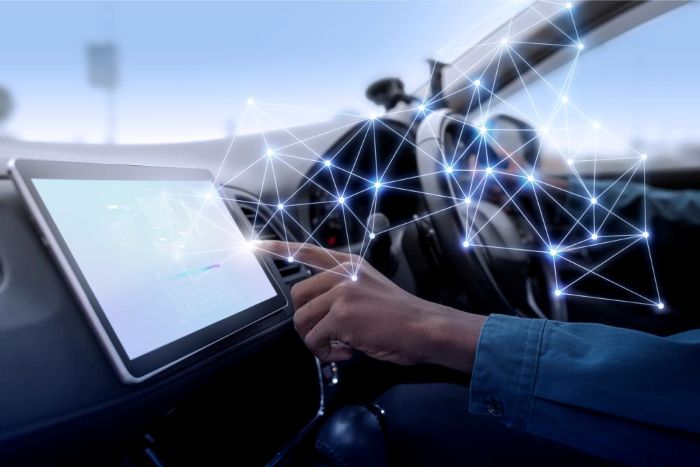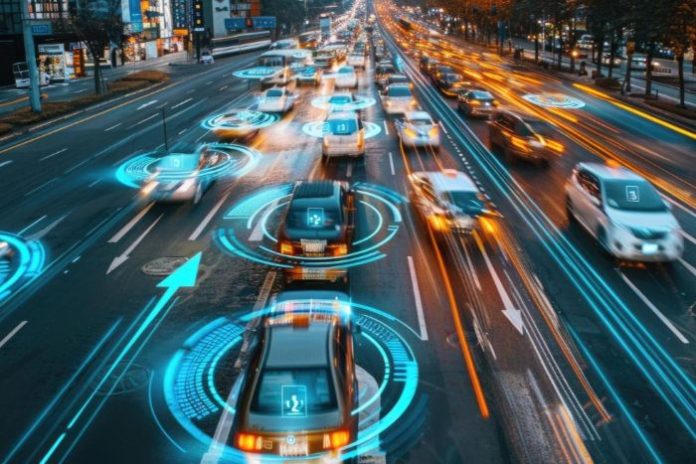Are you ready for your next O’Hare car service ride to be orchestrated by artificial intelligence? It sounds like science fiction, but AI is rapidly transforming the car services industry, promising unprecedented efficiency, personalization, and profitability. But how exactly is this happening, and what does it mean for corporate clients and leisure passengers alike?
Buckle up as we explore how AI is driving the future of car service businesses, changing everything from booking to the backseat experience.
Key Takeaways
- AI is revolutionizing car services by enhancing booking processes, fleet management, and customer experiences.
- Intelligent booking platforms use machine learning to customize rides and optimize pricing based on demand.
- AI algorithms facilitate real-time traffic adaptations and predictive maintenance, ensuring smooth and timely rides.
- Personalized experiences and loyalty programs powered by AI foster customer loyalty and engagement.
- Embracing AI in car services increases efficiency and profitability while maintaining the essential human touch.
Table of Contents
- The Dawn of the AI-Powered Ride
- AI: The Brain Behind the Booking Car Services
- Personalization: The Key to Customer Loyalty
- Customized Ride Preferences
- Loyalty Programs and Rewards
- Targeted Marketing and Promotions
- Navigating Chicago: The AI Advantage
- The Future is Now: Embracing AI in Your Car Services Business
- Conclusion: The Road Ahead
The Dawn of the AI-Powered Ride
For decades, the car services industry relied on traditional methods: phone calls, manual dispatching, and human intuition. While these methods worked, they were often inefficient and prone to errors. Today, however, AI is stepping in to optimize every aspect of the limousine business, offering once unimaginable solutions. From streamlining operations to enhancing customer experience, AI is proving to be a powerful ally in the quest for better transportation.
AI: The Brain Behind the Booking Car Services
Imagine a world where booking a ride is effortless, seamless, and perfectly tailored to your needs. AI is making this a reality.
Intelligent Booking Platforms
Intelligent booking platforms are revolutionizing the reservation process. These platforms use machine learning algorithms to understand customer preferences, predict demand, and optimize pricing. By analyzing vast amounts of data, they can offer personalized recommendations, suggest optimal pickup times, and even anticipate potential delays. For instance, an AI booking system might remember that you always prefer a quiet ride with no music and automatically apply this preference to your future bookings.
Chatbots and Virtual Assistants
Forget waiting on hold with a dispatcher; AI-powered chatbots and virtual assistants are available 24/7 to answer questions, take bookings, and provide real-time support. These AI agents can handle a high volume of inquiries simultaneously, freeing up human agents to focus on more complex issues. When interacting with a chatbot, it’s best to be specific and clear in your requests to ensure the AI understands your needs accurately.
Demand Prediction and Dynamic Pricing
AI algorithms can also analyze historical data, weather forecasts, and local events to predict demand for car services. This allows businesses to adjust pricing dynamically, maximizing revenue during peak hours and attracting customers during off-peak times, ensuring that you can always get a ride when you need it, even during busy periods, although prices may be higher.
Smarter Fleets, Smoother Rides
Beyond the booking process, AI is transforming fleet management, making it easier for limousine companies to optimize their resources and provide a better car service to O’Hare and other airports.
Real-Time Optimization
AI algorithms analyze real-time traffic data, weather conditions, and event schedules to optimize routes and dispatch vehicles efficiently. This minimizes travel time, reduces fuel consumption, and ensures that passengers arrive at their destinations on time. You might see an AI-powered system instantly reroute a driver to avoid a sudden traffic jam, saving you precious minutes on your way to the airport.
Predictive Maintenance
AI can analyze data from vehicle sensors to predict when maintenance is needed, preventing breakdowns and minimizing downtime, ensuring that vehicles are always in top condition, and enhancing safety and reliability. To illustrate, AI can detect a potential issue with a tire before it becomes a flat, allowing for proactive maintenance and preventing a roadside emergency.
Driver Monitoring and Safety
AI-powered systems can also monitor driver behavior, detecting signs of fatigue, distraction, or impairment, helping to improve safety and reduce the risk of accidents. For example, AI can detect if a driver is texting while driving and provide an alert, promoting safer driving habits.

Personalization: The Key to Customer Loyalty
In today’s competitive market, personalization is key to attracting and retaining customers. AI is enabling car services companies to offer highly personalized experiences that cater to individual preferences.
Customized Ride Preferences
AI algorithms can analyze past ride history, feedback, and social media data. They use this to understand customer preferences and tailor the ride experience accordingly. This includes everything from preferred music and temperature settings to route preferences and communication styles. You could experience your preferred music playlist automatically starting when you enter the car, and the temperature being set to your liking.
Loyalty Programs and Rewards
AI can be used to create personalized loyalty programs that reward frequent customers with exclusive benefits. These benefits include discounts, upgrades, and priority booking. This encourages repeat business and fosters customer loyalty. An AI-powered loyalty program might offer you a free ride on your birthday or a discount on your next airport transfer.
Targeted Marketing and Promotions
AI algorithms can analyze customer data to identify specific segments. They then tailor marketing messages and promotions accordingly, ensuring that customers receive relevant offers that are likely to appeal to their interests. You might receive a special offer for a limo service to the next big game if you frequently book rides to sporting events.
Navigating Chicago: The AI Advantage
In a bustling metropolis like Chicago, with its infamous traffic and complex transportation network, AI can be a game-changer for car service businesses.
Optimizing Routes to O’Hare and Midway
Getting to O’Hare International Airport (ORD) or Midway International Airport (MDW) on time can be a challenge, especially during peak hours. AI algorithms can analyze real-time traffic data and suggest the most efficient routes. This ensures that passengers arrive at the airport with plenty of time to spare. The system can factor in construction delays, special events, and even the likelihood of traffic accidents to choose the optimal route to the airport.
Real-Time Traffic Adaptation
Chicago’s traffic patterns can change rapidly, making it difficult for drivers to navigate the city effectively. AI-powered systems can monitor traffic conditions in real-time and adjust routes accordingly. This minimizes delays and ensures a smooth ride. If a major highway is suddenly closed due to an accident, an AI system can automatically reroute drivers to avoid the congestion.
Optimizing Dispatch in High-Demand Areas
During peak hours or special events, demand for car services in certain areas of Chicago can spike dramatically. AI algorithms can analyze demand patterns and dispatch vehicles strategically, ensuring that customers can get a ride when and where they need it. The AI system can predict that demand for rides will be high near Wrigleyville after a Cubs game and proactively dispatch more vehicles to the area.
The Human Touch Still Matters
While AI offers numerous benefits, it’s important to remember that the human touch still matters in the car service industry. Passengers value personal interaction, empathy, and a sense of connection. The most successful AI implementations will be those that enhance, rather than replace, the human element.
Empowering Drivers
AI can provide drivers with valuable information and tools to improve their performance, but it shouldn’t replace their judgment or autonomy. Drivers should be empowered to make decisions based on their own experience and knowledge of the local area. The AI can suggest an optimal route, but the driver should be able to deviate from it if they know a better alternative.
Focusing on Customer Service
AI can automate many routine tasks, but human agents should still be available to handle complex issues and provide personalized support. Customer service representatives should be trained to use AI tools effectively and to empathize with customers’ concerns. If a customer has a complaint about a ride, a human agent should be able to listen to their concerns, offer a sincere apology, and take steps to resolve the issue.
Building Trust and Relationships
The car services industry is built on trust and relationships. Passengers want to feel safe and comfortable with their drivers, and they want to know that their needs are being met. AI can help to facilitate these relationships by providing drivers with information about their passengers and enabling personalized communication. For instance, the system could show the driver that a frequent customer is traveling with their elderly mother. This could prompt them to offer extra assistance with luggage.
The Future is Now: Embracing AI in Your Car Services Business
If you’re a car services business owner, now is the time to embrace AI. The benefits are clear: increased efficiency, improved customer experience, and enhanced profitability. Don’t try to implement AI across your entire business overnight. Start with a specific area, such as booking or fleet management, and experiment with different AI tools and solutions.
It’s helpful to begin by implementing an AI-powered chatbot to handle basic customer inquiries and free up your human agents. Ensure your employees are properly trained to use AI tools effectively. Provide ongoing training and development opportunities to help them stay up-to-date with the latest advancements. Train drivers on how to use AI-powered navigation systems to improve their efficiency and reduce stress.
Since AI relies on data, it protects customer privacy and security, implements robust data governance policies, and invests in security measures to prevent data breaches. Be transparent with customers about how you collect and use their data. Partner with AI experts who can help you identify the best solutions for your business and implement them effectively. Look for partners who have a proven track record of success in the car service industry.
Conclusion: The Road Ahead
From algorithms to asphalt, AI is transforming the car services industry at an accelerating pace. By embracing AI, car service companies can optimize their operations, enhance customer experience, and improve their profitability. While the human touch will always be important, AI offers a powerful set of tools to help businesses thrive in today’s competitive market.
For example, A1 Classic Limo Group is exploring AI-driven solutions to personalize the ride experience and optimize its fleet. So, take the wheel and explore the possibilities of AI; the future of car service is waiting.











